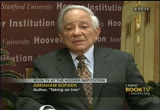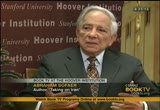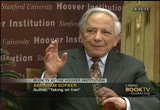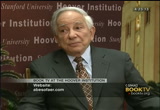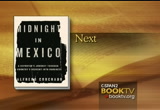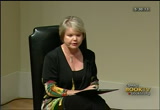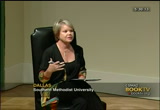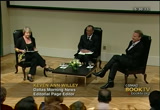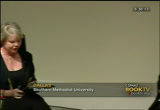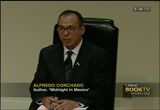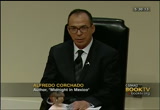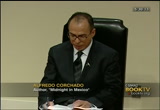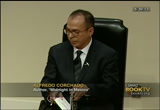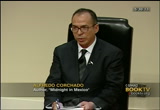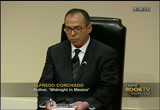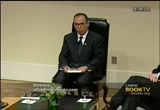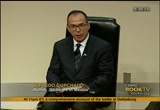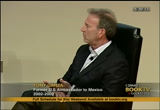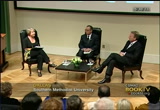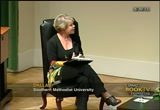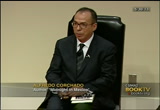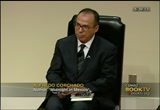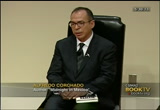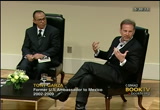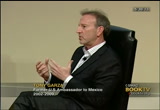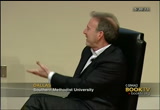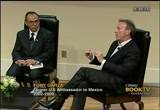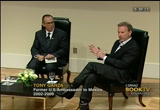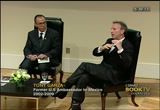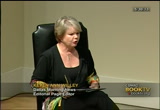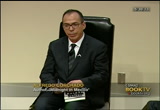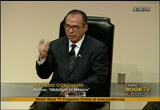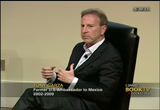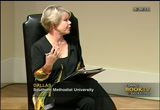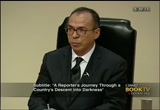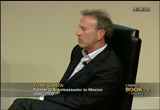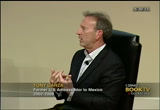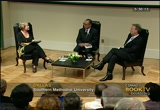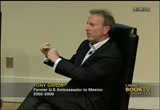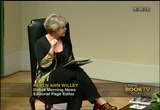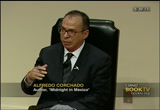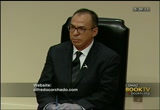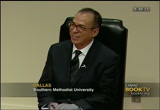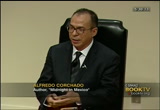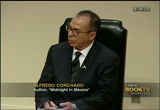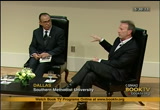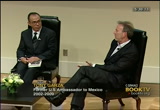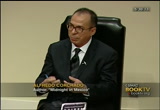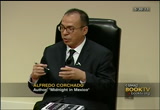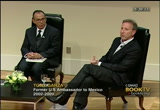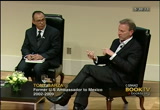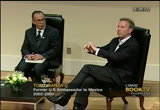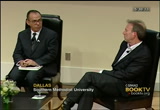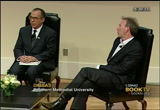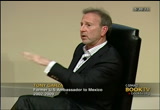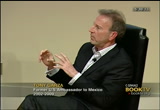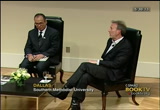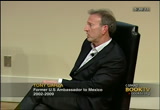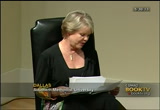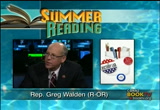tv Book TV CSPAN June 29, 2013 9:00pm-10:01pm EDT
9:00 pm
9:01 pm
egyptians or iraqis by group in the house respect -- parents spoke arabic and we were a rather secular family we had belly dancing which is not exactly religious but definitely coulter lead middle eastern. so when they would come in it is something that i was pretty used to and i think we added disadvantage if we send people to negotiate who were used to western style rational negotiation. they're negotiating is definitely different the end result is often the scene with the same principles trust but verify a applies.
9:02 pm
but the process is different >> how close is everyman to acquiring nuclear weapons? >> they think they already have the ability. no doubt according to the national security in the united states. we have a very solid reports where each of the capacities of what they need for a nuclear weapon have often found to a-6 -- exist by the inspector. so i think they can do it. how long would it take them if they made up their minds? the only enriched some uranium.
9:03 pm
9:04 pm
[applause] we'll afford to spending the next hour with you. i will expand on the introduction in a letter to distinguished panelists then we will move the conversation through a specific topic federal open it up for questions. you were given little cards has you think of questions please write them down and passed into the end and we will bring those up during the last portion of the meeting. so little bit more about alfredo corchado there are several things you know, already but born in new mexico and was the oldest of
9:05 pm
981st aid to california then texas. he is a graduate of el paso community college and 2008 / 2009 nieman fellow. one other thing you probably already know he has been reporting over 20 years in due to the bravery and courage and enterprise has been awarded from the columbia eric journalism school. so let me tell you a few things maybe you did not know about him.
9:06 pm
he brought up the national security issue in four different continents from west africa, great britain mexico in the united states something else you might not know he does relish the opportunity to right in addition to the essays that often come out of mexico and also about the balladeer that sings but not necessarily in this order in his favorite brand of tequila? [laughter]
9:07 pm
9:08 pm
9:09 pm
9:10 pm
9:11 pm
9:12 pm
>> that lovely passage from the book "midnight in mexico" a reporter's journey through a country's descent into darkness". >> rarely at the beginning of the book i will walk you through from 2007 i have been doing a lot of interviews on the radio out of mexico city when they were trying to celebrate the war. that evening come right before three names came up.
9:13 pm
9:14 pm
9:15 pm
9:16 pm
9:17 pm
9:18 pm
9:19 pm
9:20 pm
by dree was always to somehow come back and reconnect with my culture of my language. so i thought my reporting would lead to better understanding. to come from a different perspective, i feel like i have lived in mexico a year the united states washington d.c. cover that is our way see it. but we lived on the border id of basso a and is just something you do not to mess around with because it could come back to bite you. and a long dash but then
9:21 pm
9:22 pm
9:23 pm
between the two cultures is along the border in the sense of the communities but this is a conversation we have once every couple of weeks for what it means to be either latino or texan where you have this convergence going on between the two countries. how do you find a sense of self and how do you relate to the country? how do mexicans see themselves? increasingly they see themselves as more integrated into the marketplace. each day it takes a step to be more modern and
9:24 pm
competitive both economically and politically. both in terms of economic growth with democracy and open this say growth of the middle-class. i think they see themselves now to be more prepared and that is said good thing. not without the challenges but they see themselves that way. >> you will confident? >> always the journalist. [laughter] >> he did the same thing on
9:25 pm
the plane ride back i said you can play -- be in the play but we've the notebook in the pocket. so that is when you know, . [laughter] put your notebook away. [laughter] >> that is a great story for you to tell. therein is a sense. >> they don't have any choice. even the country will say no. we won the agenda of reform
9:26 pm
9:27 pm
9:28 pm
even if they wanted to go back in style and that is let's restore some semblance of order. there are very few things they do have the economy that was not growing. federal think they say give us 70 more years. >> i want to return about covering the country and the hope and the heartbreak kid i remember there is a scene that you are describing a lawyer for the cartel told you that the more you of
9:29 pm
your kids insist on democracy the bourse to wage you will find. i thought that was such ut telling'' a and to ask you to talk about that you think americans should quit and assisting on a democracy that is a lost cause? >> i think that is right in the sense i feat of your kids want instant democracy a and the more i realize as a lawyer and later assassinated. but i also realized that the change is happening.
9:30 pm
they went to their moments but as a journalist i am always encouraged his icy the best of mexico and a civil society people try to hold the government accountable. the other stories in it is a birthday party with mostly young adults. we come with the story and people had just given up on mexico. two days later with the u.s. delegation.
9:31 pm
but the next day several people tell me be here at the bridge could you come pick us up? these are people who had given up. but these same people have formed a community theater fighting back. >> a and a struggling with how much more he experienced. from nine vantage point, you hear about these things in d.c. the intelligence reports but it is the
9:32 pm
humanity of it with the the things i was struck kid with the book is reading these things and processing and trying to report them a and feeling the warmth of the skin that really brought home for me the letters did what was going on with the abstract but this made it even more real. even the period i was looking at. >> eight you are the ambassador with a view out who are among some people is that the way it should be?
9:33 pm
is that a way to bridge the to? >> you try to get a sense and in terms of the violence people growing up along the border. and how this was no longer with those accommodations and at with the altogether level in that sense but day in and day out i could imagine what it felt like but it was like to be there to be given the middle of the.
9:34 pm
>> one thing that i found interesting was again and again you would think in mexico city to talk to the ambassador. and i found this interesting. should the u.s. we doing something? and i asked mexicans what you want the united states to do? they said don't leave us alone or don't ignore us. because then they change the narrative and i know that
9:35 pm
many readers are sick of it. i know that i am i like these much more but had low do look guess as a victim? how do you say that to them but the things have changed or the narrative has changed? mexicans want someone to learn from their mistakes. >> they do a and they don't. and also sitting down with
9:36 pm
9:37 pm
that is you can tell the government that is the expectation. but that is democracy of the expanding middle class. it is very interesting to say we can't do this but you will? >> it is interesting with that analogy one of the messages you urged us to consider was the partnership with columbia with that weight is so it is a very precarious relationship and delicate. what advice would you give to the current ambassador?
9:38 pm
>> i see it is a relationship that has its own history. it is the movement of goods with the convergence of the economy is but if you look at main street, 70 percent once immigration reform. conversely if you listen he may think the relationship is very tense but just made street mexicans in general want to much better
9:39 pm
relationship with the united states. so my counsel would be to focus on trade because there is no more critical argument in the book. focus on trade to build cultural relationships and political leadership will follow because by and large both countries redo have better relationships. >> all the news that america is gatt add of mexico seems dominated by violence or drug cartels that go with that. one of the passages that stuck in my mind was where you describe the conversation to whether president called around to its awarding as he was at the top of the list so seriously that he actually
9:40 pm
taped a message and left it for his children in the event something happened to him in pursuit of what he thought was important. how has the level of violence on since then? you have no way to know but what about the current president? >> the current level hasn't really changed. the government comes out to say but to look at the numbers, maybe if you categorize it, what is changing is the spots used to be the northeast and to walk now you see it right
9:41 pm
next to mexico city. so the conditions of this happening. >> we will start taking questions from the audience is limited so pass them for word. we will consider them. so to talk about different death threats and another that you took seriously, what made you feel safe to return? >> and the u.s. passport. and having contacts within both governments.
9:42 pm
but i never really felt unsafe. and i also feel like it is not to take chances but to cover this story because there are a lot of areas in mexico where people are forced to send to themselves if you don't cover the story you're adding to the violence and that's what drives me back. >> aside from knowing how to store your book and how to navigate but that is a long story. >> the hardest things was as
9:43 pm
a reporter you're used to be protected to put yourself but i credit my editor in the arcane and here. that's to look at the copy was the reporter the real you? one of the things that guided me through was just listening to songs and music sometimes listen to them 30 times to really force myself but many york editor was very clever to say let's have dinner then would ask me questions. then she would say that is
9:44 pm
not what you told me or how you told that. so it took a lot. that was the hardest to expose yourself. >> you spend a lot of time of all sides of the border. are there those things for us to have a greater appreciation about mexico what would that be or what point did it during its is the most frustrating? >> the beauty of mexico, the humanity that the resiliency that they have. something has always drawn the back is the sense of courage with hard-working people and they do not give up. i see that a lot in the
9:45 pm
people that i interview. people who have low will maybe i'll learn that from my parents but that is how i thought. >> you spend that time to. >> probably very similar. there is a lot of mexico i want people to see just like this date that i could see as i traveled around in my political life. sometimes something as simple as sitting on a park bench. and then this most beautiful
9:46 pm
in to get out and do would again. but just like there are so many places but i would say with the rhythm of a and the feel of the country it is pretty special. >> levy asked the reverse what about the united states are the point of ignorance? >> and from el paso. but there is so much that we offer of the resilience in the strings and the optimism of the american people. we have a healthy cynicism.
9:47 pm
9:48 pm
holding the government accountable. one of the things that maybe you don't know is if those that went to mexico and it just shows how much tourism has expanded. >> speaking of journalism journalism, reporting is such a difficult story how do you decide who to trust? >> that is always tough. if you cover organized crime you have to spend time with people one of the avenges i think that i have based in mexico city and on the border that gives me contact information and but they're
9:49 pm
always changing officials. it is always getting back to say what you know, about this dire this person? and checking and checking and checking. >> i assure you had some of the same challenges. >> we had that conversation he knows it better with a journalist in the united states and in mexico but from the standpoint from what you trust your little lazier rivers -- he would hear little rivers. you have to play the he and that you are dealt in you never trust completely it
9:50 pm
expects to constantly confirming then it is a very the situation depending on the situation and the individual. >> a and continue reid to discuss a solution for the cartel should we legalize drugs? are there other answers? ten words or less that is tough. >> it will be a country that has a much healthier rule of law for it to contain what we had it will be roulade but as far as immigration we will never legalize it we shouldn't the cocaine there are things that they will
9:51 pm
not legalizes so you need to make the institution and strong enough with the players in those arenas. >> even if you were to legalize more broadly there is still more potential for those who moved into the united states for those who did not qualify. so if mexico does not build stronger institutions we have those that deal with those that is where texaco ultimately pass to go with a rule of law society it will make it much more competitive on the business side as well.
9:52 pm
and it takes away from their competitor. >> why don't we cover the cartel's? why don't we tell people? and last week we had the mexican attorney henry cover that and said it was a targeted him from a mexican and cartel and for those that actually a coordinated and sanction that in north texas. and it actually happens but you are right it is in different forms in different ways because of rule of law. >> my comment was we should not be surprised or every
9:53 pm
case will be settled there as well. i don't want to sound indifferent it is just a reality. is there a distribution in networked where the network would exist? we hate to see it. >> day think the public gore the media specifically fully understand the distribution? >> i know they spent a lot of resources for those that
9:54 pm
detail the penetration. i have received more reporting but that is one area we have to do much more. of a curious who operates to find out how do they work or function? how you kill an attorney in thank you will get away with that? >> we had a lot of these conversations i am not sure anybody completely under status with the movement of both drugs and the movement of many. what i am asked about but in
9:55 pm
many respects is the spillover of the election and that capacity of the large amounts of money in that capacity to intimidate so we have to be vigilant you hear stories of these focusing in on the academy's for there being framed for those that might be vulnerable. those are things we causally have to be aware of. and in some ways, more insidious.
9:56 pm
at 1.along this stretch of border then you have one of the other federal agencies in arizona. we're not immune but we have to be aware it is not just the violence. >> how much of a role does the west play in terms of money laundering or guns across the border? are there steps that we should be taking beyond what is already done? what would you recommend? >> i think it is already being done. it is one of those issues we
9:57 pm
were slow to appreciate completely we have got in a lot more aggressive in the institutions themselves. the big financial institutions did not want to be party to this with the large financial institutions are really stepping up and the guns are from different challenges. and it is not a populist thing to say. they get a bad rap on this one.
9:58 pm
i mean the larger ones coming from central america it was columbia but it is a challenge. i put them out there it was no easy answer. >> i know where we're always blamed i don't comment i just keep writing. >> i think we are about out of time. levied just take a quick moment to thank our partners here tonight most especially the center for housing this
9:59 pm
10:00 pm
send us an e-mail@booktv@c-span.org. upnext after words with guest host kimberly. the founder for the institute of the study of war. victor davis hanson and the "the savior generals: how five commanders saved wars that were lost -- from ancient greece to iraq." profiles five generals that he says single handedly turned around wars that they were losing. the program is about an hour.
77 Views
IN COLLECTIONS
CSPAN2 Television Archive
Television Archive  Television Archive News Search Service
Television Archive News Search Service 
Uploaded by TV Archive on

 Live Music Archive
Live Music Archive Librivox Free Audio
Librivox Free Audio Metropolitan Museum
Metropolitan Museum Cleveland Museum of Art
Cleveland Museum of Art Internet Arcade
Internet Arcade Console Living Room
Console Living Room Books to Borrow
Books to Borrow Open Library
Open Library TV News
TV News Understanding 9/11
Understanding 9/11